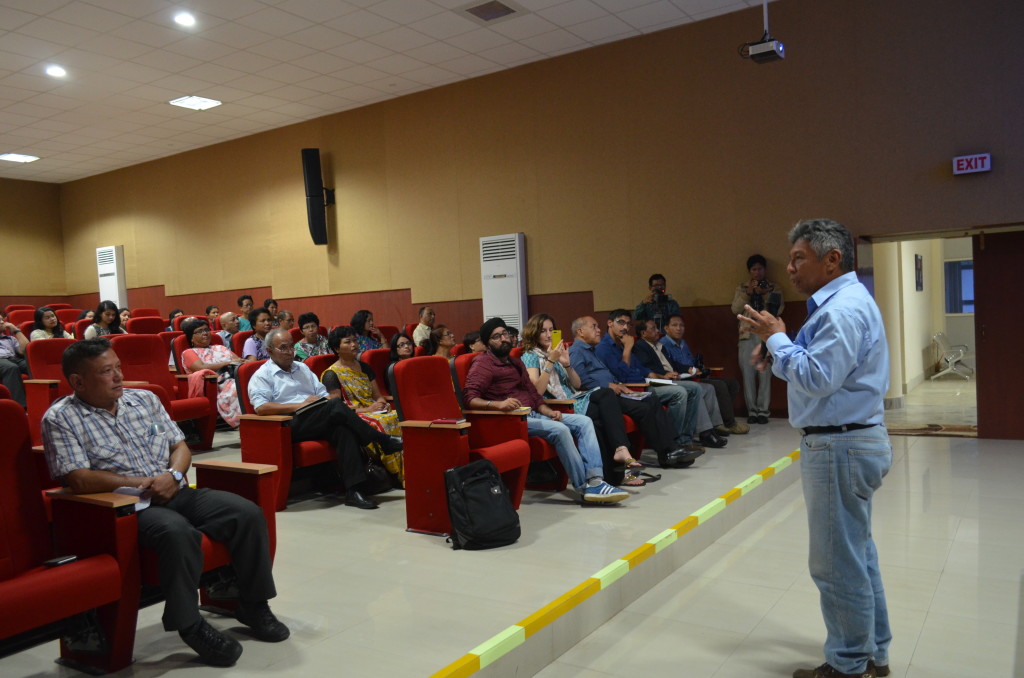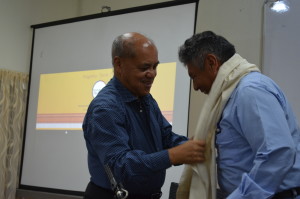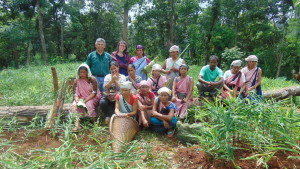
Dr.Francisco Rosada May addresses an audience of Government officers from the Directorates of Agriculture and Horticulture.
Photo: NESFAS/Raisa Daimary
Following a hectic week travelling to various parts of Meghalaya, Dr Francisco J Rosado May ended his stay here with two back to back lectures. The first was held at the Integrated Agriculture Training Centre, Upper Shillong at a meeting with various officers of the Directorates of Agriculture and Horticulture called by Principal Secretary (Agriculture), Mr Pochester Kharkongor. The departments have been supporting NESFAS in its various agriculture related activities. The second was held later in the day at the MRDA Hall, Shillong which was organized by the Meghalaya Basin Developement Authority. These lectures are the second and third of the NESFAS Lecture Series that are being organised as a run up to the Indigenous Terra Madre (ITM) 2015 locally known as International Mei-Ramew (IMR) 2015.
To begin with Dr Francisco in his lectures introduced his audiences to the concept of agroecology – a discipline that involves the study of the structure and function of an agricultural system keeping in mind the various aspects that influence it – ecology, availability of technology and socio-political systems. Dr Francisco spoke about how similar his culture is to Meghalaya’s despite the distance between them giving the example of various traditional knowledge present with the indigenous peoples od Megahlaya and Mexico in terms of just even agriculture or for that matter the discovery of the concept of the number ‘Zero’ which came from both cultures. He also spoke about how agriculture systems can be transformed gradually to become more sustainable in four simple steps – reduction of use of external supplements to better crops, substituting these supplements with natural products, designing a better system and finally networking and creating spaces where there is “intercultural” exchange of knowledge. He went on to explain “intercultural interaction” which involves in sharing of traditional knowledge between cultures which have scientific basis – as seen in West Khasi Hills sometimes these knowledge are not realized but practiced and can be helpful for other cultures. Setting the example of his country which is home to 364 families of native languages, he spoke about the 11 Intercultural Universities that are present in his country itself that promote intercultural exchange. He also spoke about the possibility of creating such spaces for coexistence of different cultures for synergy in Meghalaya.

Shri Phrang Roy, Chairman NESFAS, honours and thanks Dr.Francisco Rosado may with a Ryndia Shawl from village community of Rhiboi district. Photo: NESFAS/Raisa Daimary
When asked about his take about the agricultural scenario in Meghalaya, he said that apart from the similarities he saw in the cultures he noticed that women played a big role in in the farming systems here. He pointed out that they had better powers of observation and planned their agricultural plots better using their observations. He suggested that this could be built upon. He also pointed out that the communities that he visited in Meghalaya still had a lot of traditional knowledge and those that didn’t were ready to reencounter their traditional knowledge. Dr Francisco stressed on the need for civil societies and the government to get together to make a strong policy that supports and validates Indigenous traditional knowledge of the sake of a sustainable future. While the interaction with the two directorates brought out questions on sustainability of livelihoods, the interaction at the MBDA hall led to questions that were related to land issues and the possibility of creating an intercultural centre here in Meghalaya among others. For the facilitation of addressing of more sensitive issues like land reforms and educational systems in Meghalaya as well as India, Dr Francisco stressed on the need for government policies that are sensitive to the peoples needs. However while we wait for policies, as youths and concerned individuals, he suggested working with civil societies like NESFAS that document and promote Indigenous traditional knowledge.
Mr.N.S.Nongbri, Joint director Director Agriculture(R&T), when asked about his views on Agroecology, said that it is a new subject and rather complex. He pointed out that there are macro and micro aspects to agriculture in Meghalaya and that although in the macro aspect an application of agroecology could prove to be difficult, in the micro level there is a possibility of application in the state because of the presence of some level of awareness among the communities. This he says, will however, require a change in mindset of the larger population.
BACKGROUND OF VISIT
With the objective of giving Dr. Francisco J Rosado May a sense of the various agricultural practices of Meghalaya, visits were arranged by NESFAS for him to villages in the West Khasi Hills Area, Ri-Bhoi District and the Jaintia Hills District. He will also visit the Phek district of Nagaland later this month and attend the local food festival as the culmination of his tour organized as a Pre-Indigenous Terra Madre event. NESFAS, being eager to promote Agroecology in Meghalaya and the North East region of India, took the opportunity to host Dr. Francisco and facilitate a sharing of ideas on agroecological practices in the state within the North East Slow Food & Agrobiodiversity Society (NESFAS) office and with various communities. Dr Francisco’s visit to the West Khasi Hills took him to Porksai and Pyndengmawlieh in the Lyngam area, Khweng in Ribhoi and Moosakhia in West Jaintia Hills . These visits were organized between 20th and 25th of August 2015 and he was received with tremendous enthusiasm by the communities. The NESFAS team members who joined him witnessed a wonderful exchange of knowledge and enthusiastic interaction. Similar experiences were shared in Ribhoi and West Jaintia Hills too.
 Translate
Translate





